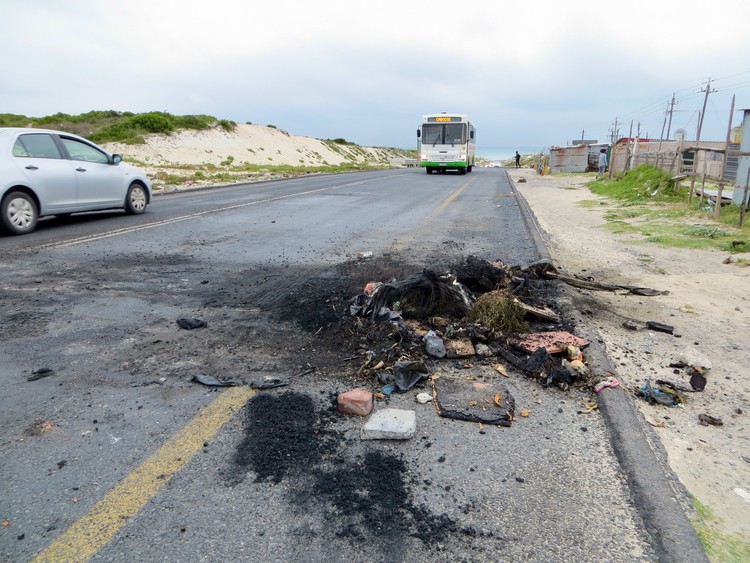No water, electricity or toilets for 280 families in Khayelitsha informal settlement
Residents say they have lived without basic services for three years
Shack dwellers in Zinzi informal settlement, Khayeltisha, protested on Friday and Saturday over lack of services. They said they would have continued to protest were it not for a police presence. Photos: Vincent Lali
- About 280 families live in Zinzi informal settlement in Khayeltisha, established at the height of the Covid pandemic in July 2020.
- They live without toilets, water standpipes or electricity.
- For two days they protested by burning tyres on Baden Powell Drive to get the attention of the City of Cape Town.
- The City says its project management team is “awaiting information”.
“We wanted to continue with the protest today [19 March], but the presence of the police deters us,” said Anathi Philiso, community leader for Zinzi informal settlement in Khayelitsha, Cape Town.
On Friday and Saturday, protesting shack dwellers blockaded Baden Powell Drive with burning tyres.
“We have burned tyres to draw the attention of the City to our lack of electricity, toilets and water in our area,” said Thandokazi Zolwana. “We turned cars back peacefully. We didn’t injure or damage any car, but the police shot us with rubber bullets.”
When GroundUp visited Zinzi on Sunday, police were monitoring the situation.
Sandile Kave, who works as a guard in Pinelands, was shot in the leg. “I can’t go to work because I can’t walk properly and my leg aches,” he said.
Zinzi was established in July 2020 at the height of the Covid pandemic. Backyarders in Zwelitsha, Vosho informal settlement and other sections of Enkanini occupied the land initially. At the last count, three months ago, there were 280 families living in the informal settlement.
A long period without water sparked the protests on the weekend.
Occasionally the City sends a water truck, according to Philiso, but there had not been a delivery for three weeks. It also rarely comes on weekends, which is when they need water to do laundry.
“Now our blankets are dirty because we can’t do laundry,” she said.
Also, during the week, when people are at work or out job hunting, they miss the truck.
“We don’t have a single tap here,” said Philiso.
Most of the time residents beg for water from other settlements which have serviced sites. But on Sunday, the taps at neighbouring Zwelitsha were dry. “So we can’t bathe or cook,” said Philiso.
When a fire caused by a paraffin stove broke out three weeks ago in a shack, they had tried to douse it with sand, but the shack burnt down. “If we had water taps, we would have extinguished that fire and saved the shack,” said Philiso.
There are no toilets in Zinzi. Philiso digs a hole in her yard. Others have to cross Baden Powell Drive to use an open field.
“We make our kids shit in buckets for the whole day while we are at work because we don’t want them to be run over by cars while they cross the road,” said Esethu Nyangaza.
She said sometimes she also has to use a bucket because people are holding prayer sessions in the field.
For electricity people use informal connections to serviced sites if they can afford it. They pay R400 a month. Most people use candles for light and paraffin stoves to cook. The settlement is dark at night and unsafe, said Nomhisa Harris.
“They are new and therefore don’t qualify for proper services,” said Ward 95 Councillor Ayanda Tethani (ANC). “We waited for more than ten years before we got electricity in [other parts of] Enkanini,” he said.
He said he would meet senior officials to see if emergency services could not be deployed.
Councillor Siseko Mbandezi, acting Mayoral Committee Member for Water and Sanitation, said, “The City can confirm that there is water being delivered to the area, and has been informed by the project management team that they are awaiting information regarding the number of households in the area, so that the process to acquire sanitation services can be initiated.”
The City referred us to Eskom which supplies electricity to Khayeltisha. We are awaiting Eskom’s response.
Western Cape police spokesperson Warrant Officer Joseph Swartbooi said, “Approximately 100 disgruntled community members staged a public protest on Friday in Enkanini. One male was arrested and detained on a charge of public violence. Once charged the suspect is expected to make a court appearance in the Khayelitsha Magistrate Court.”
Support independent journalism
Donate using Payfast

Don't miss out on the latest news
We respect your privacy, and promise we won't spam you.
Next: Nontsikelelo Zwedala: an unsung hero of the struggle for HIV medicines
Previous: Old apartheid police station is a place of hope in Sharpeville
© 2023 GroundUp. This article is licensed under a Creative Commons Attribution-NoDerivatives 4.0 International License.
You may republish this article, so long as you credit the authors and GroundUp, and do not change the text. Please include a link back to the original article.
We put an invisible pixel in the article so that we can count traffic to republishers. All analytics tools are solely on our servers. We do not give our logs to any third party. Logs are deleted after two weeks. We do not use any IP address identifying information except to count regional traffic. We are solely interested in counting hits, not tracking users. If you republish, please do not delete the invisible pixel.


